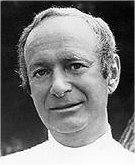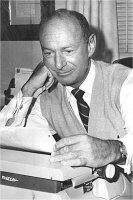In Remembrance: Ernest Lehman
 Ernest Lehman, the six-time Academy Award nominated screenwriter
behind such films as Sweet Smell Of Success and North By
Northeast as well as several stage to film adaptations, has
passed away on July 2, 2005 in Los Angeles, CA. He was 89.
Ernest Lehman, the six-time Academy Award nominated screenwriter
behind such films as Sweet Smell Of Success and North By
Northeast as well as several stage to film adaptations, has
passed away on July 2, 2005 in Los Angeles, CA. He was 89.
Born on December 8, 1915 in New York City, Lehman was raised on Long Island. He initially wanted to pursue a career as a chemical engineer, but switched to literature while attending City College of New York. His first job, writing for a Wall Street financial periodical, lasted only a short time, as it folded soon after he was hired. Lehman became a freelance writer, writing publicity pieces for Broadway theatrical agencies as well as magazine articles. He would later draw upon these experiences when writing the novella “Tell Me About It Tomorrow,” which he later adapted into Sweet Smell Of Success. Concentrating more on fiction, Lehman eventually had over 50 short stories and novellas published by Colliers, Cosmopolitan, Esquire and Redbook. One novella, “The Comedian” was adapted by Rod Sterling into an Emmy-winning installment of the series Playhouse 90 starring Mickey Rooney.
In 1954 Lehman was offered a position on Paramount Studio’s writing staff, but was almost immediately loaned out to MGM Studios to work on the film Executive Suite starring William Holden, Barbara Stanwyck, Walter Pidgeon and June Allyson. The film was directed by Robert Wise and marked the first of four times the pair would work together. His screenplay received the first of his nine Writers Guild Award nominations.
Back at Paramount, Lehman worked on adapting the Broadway play Sabrina Fair by Samuel A. Taylor for director Billy Wilder, taking over writing chores, reportedly after an abrasive Wilder drove Taylor off the project. Wilder had begun shooting the film without a finished script and Lehman worked feverishly to keep at least 24 hours ahead of the shooting schedule. If script pages were not ready, Wilder would ask his lighting director for unnecessary changes or have star Audrey Hepburn feign illness in an effort to stall for time. It was a pace that drove Lehman to nervous exhaustion, forcing the production to be shut down for two days while he recovered. The film, with its title shortened to simply Sabrina (1954), was a hit and earned Lehman, along with Taylor and Wilder, an Academy Award nomination for Best Adapted Screenplay and Lehman’s first Writers Guild award.
Lehman earned his second Writers Guild award for his work on his next film, an adaptation of Rodgers and Hammerstein's musical The King and I (1956). He followed the musical with the Rocky Graziano bio-pic Somebody Up There Likes Me (1956), working again with director Wilder and receiving another Writers Guild award nomination.
Lehman next worked on the screenplay for Sweet Smell Of Success, with an eye on directing the film himself. Instead, the studio brought in British director Alexander Mackendrick, while playwright Clifford Odets made a pass through the screenplay. Although a box office disappointment upon its initial release, it is now considered one of the defining films of the 1950s.
 |
|
Ernest Lehman at work, circa 1966. |
Lehman’s next screenplay assignment came as a result of a lunch meeting with director Alfred Hitchcock, who wanted the writer to adapt the Hammond Innes novel The Wreck Of The Mary Deare. When Lehman declined, Hitchcock asked him to create an original screenplay out of three elements: a case of mistaken identity, The United Nations building and a chase across the top of the Mount Rushmore monument. Lehman accepted and the result was the thriller North By Northeast (1959), which earned Lehman his second Oscar nomination and his fifth Writers Guild award.
Following his adaptation of the John O’Hara novel From The Terrace (1960) for director Mark Robson, Lehman teamed with Wilder for adaptations of the musicals West Side Story (1961) and The Sound Of Music (1965). He would win Writers Guild awards for each picture in addition to another Oscar nomination for West Side Story. Although not nominated for an Academy Award, Lehman’s work on The Sound Of Music - which included rearranging plot points and changing the order of songs – has been considered to make the film excel over the stage version.
Wanting to gain greater creative control of his projects, Lehman was able to get himself appointed as a producer on his adaptation of Edward Albee’s Who’s Afraid Of Virginia Woolf?. Lehman reportedly fought to have the unproven Mike Nichols named director, as well as had Haskell Wexler replace the film’s original cinematographer who had attempted to “beautify” an intentionally de-glamorized Elizabeth Taylor. He also convinced Warner Brothers studio head Jack Warner to leave the original play’s foul language intact. The film was a success and has become the only film so far in Academy history to be nominated in all 13 categories it was eligible for. Lehman himself earned two nominations for Best-Adapted Screenplay and Best Picture and would receive his fifth Writers Guild award.
Lehman performed double duty as a writer and producer next on 1969’s Hello Dolly!, which earned him another Oscar nomination for Best Picture. For his next film, an adaptation of Portney’s Complaint (1972) starring Richard Benjamin and Karen Black, Lehman finally got his wish to direct. However, the film didn’t perform as expected and Lehman chose to concentrate on writing and producing. He scripted the dark comedy Family Plot (1976) for Alfred Hitchcock - earning his final Writers Guild award nomination in the process - and adapted the thriller Black Sunday (1977) for director John Frankenheimer. Lehman then retired from screenwriting, returning to his literary roots writing novels and magazine articles.
From 1983 to 1985 Lehman served as the president of the Writers Guild. He received the Guild’s prestigious Screen Laurel Award in 1972. Although he never won an Academy Award in the six times he was nominated he was awarded an honorary Oscar in 2001.